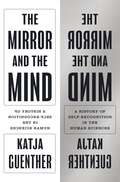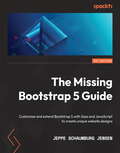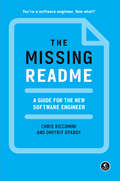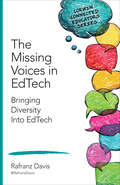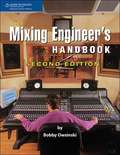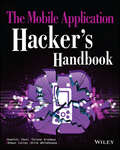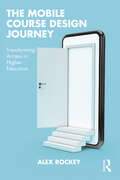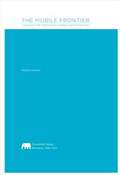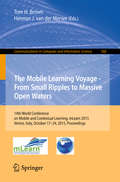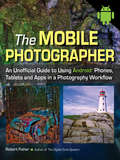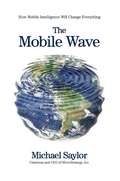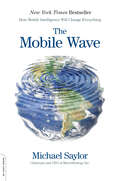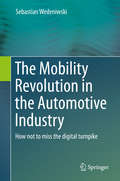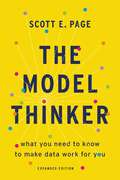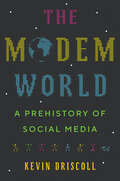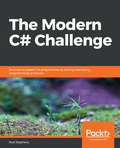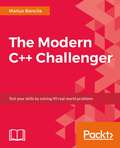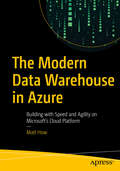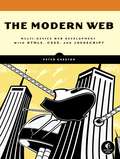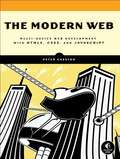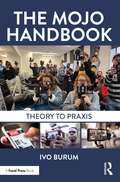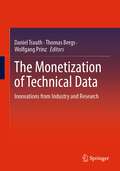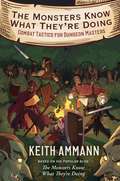- Table View
- List View
The Mirror and the Mind: A History of Self-Recognition in the Human Sciences (Princeton Modern Knowledge #7)
by Professor Katja GuentherHow the classic mirror test served as a portal for scientists to explore questions of self-awarenessSince the late eighteenth century, scientists have placed subjects—humans, infants, animals, and robots—in front of mirrors in order to look for signs of self-recognition. Mirrors served as the possible means for answering the question: What makes us human? In The Mirror and the Mind, Katja Guenther traces the history of the mirror self-recognition test, exploring how researchers from a range of disciplines—psychoanalysis, psychiatry, developmental and animal psychology, cybernetics, anthropology, and neuroscience—came to read the peculiar behaviors elicited by mirrors. Investigating the ways mirrors could lead to both identification and misidentification, Guenther looks at how such experiments ultimately failed to determine human specificity.The mirror test was thrust into the limelight when Charles Darwin challenged the idea that language sets humans apart. Thereafter the mirror, previously a recurrent if marginal scientific tool, became dominant in attempts to demarcate humans from other animals. But because researchers could not rely on language to determine what their nonspeaking subjects were experiencing, they had to come up with significant innovations, including notation strategies, testing protocols, and the linking of scientific theories across disciplines. From the robotic tortoises of Grey Walter and the mark test of Beulah Amsterdam and Gordon Gallup, to anorexia research and mirror neurons, the mirror test offers a window into the emergence of such fields as biology, psychology, psychiatry, animal studies, cognitive science, and neuroscience.The Mirror and the Mind offers an intriguing history of experiments in self-awareness and the advancements of the human sciences across more than a century.
The Missing Bootstrap 5 Guide: Customize and extend Bootstrap 5 with Sass and JavaScript to create unique website designs
by Jeppe Schaumburg JensenMake your website stand out by unlocking the full potential of Bootstrap 5 and creating efficient UIsKey FeaturesFind out how to customize all parts of Bootstrap 5 with Sass, including working with the utility APICreate a unique website using only Bootstrap 5 with Sass customization and interactive featuresGrasp advanced Bootstrap 5 topics related to Sass, CSS, JavaScript, and source code optimizationBook DescriptionBootstrap is one of the world's most popular and easy-to-use frontend UI toolkits for building responsive websites, but few know how to get the most out of its vast range of components, utilities, JavaScript plugins, and other features. The Missing Bootstrap 5 Guide will help you customize Bootstrap 5 with Sass to achieve a layout that stands out from the crowd, enabling you to create something unique that doesn't look like it was created with Bootstrap.With this practical guide to Bootstrap customization, developers working with Bootstrap will be able to utilize powerful customization techniques to create websites with unique designs and exclusive features. You'll see how you can develop a visually appealing website quickly and easily by taking a hands-on approach to customizing your website using advanced features of CSS, Sass, and JavaScript. Starting with learning how the Bootstrap 5 visual style is created with Sass, you'll find out how to customize it to fit your needs while achieving the website look you want. You'll then use this knowledge to create a website using most of Bootstrap 5's components and customization with Sass and JavaScript. Finally, you'll explore various advanced Bootstrap 5 topics related to Sass, CSS, JavaScript, and source code optimization.By the end of this book, you'll be able to design and build modern, captivating, and unique websites on your own using the immense capabilities of Bootstrap 5.What you will learnIdentify the most important Sass features for using Bootstrap 5Understand the structure and content of Sass code used in Bootstrap 5Explore customization options, colors, layout, content, forms, components, helpers, and utilitiesFind out how to customize, extend, and improve a website to make it uniqueDiscover different ways of using the CSS custom properties of Bootstrap 5Get to grips with Bootstrap 5 source code optimizationWho this book is forThis book is for UI designers and developers who are familiar with HTML and have prior experience with Bootstrap. Frontend as well as backend developers using Bootstrap, who don't know how to code CSS but have a solid grasp on HTML, will also find this book useful. Experienced users of the default Bootstrap files can use this book to learn all about customization and other advanced features.
The Missing README: A Guide for the New Software Engineer
by Chris Riccomini Dmitriy RyaboyKey concepts and best practices for new software engineers — stuff critical to your workplace success that you weren&’t taught in school.For new software engineers, knowing how to program is only half the battle. You&’ll quickly find that many of the skills and processes key to your success are not taught in any school or bootcamp. The Missing README fills in that gap—a distillation of workplace lessons, best practices, and engineering fundamentals that the authors have taught rookie developers at top companies for more than a decade. Early chapters explain what to expect when you begin your career at a company. The book&’s middle section expands your technical education, teaching you how to work with existing codebases, address and prevent technical debt, write production-grade software, manage dependencies, test effectively, do code reviews, safely deploy software, design evolvable architectures, and handle incidents when you&’re on-call. Additional chapters cover planning and interpersonal skills such as Agile planning, working effectively with your manager, and growing to senior levels and beyond. You&’ll learn: • How to use the legacy code change algorithm, and leave code cleaner than you found it • How to write operable code with logging, metrics, configuration, and defensive programming • How to write deterministic tests, submit code reviews, and give feedback on other people&’s code • The technical design process, including experiments, problem definition, documentation, and collaboration • What to do when you are on-call, and how to navigate production incidents • Architectural techniques that make code change easier • Agile development practices like sprint planning, stand-ups, and retrospectives This is the book your tech lead wishes every new engineer would read before they start. By the end, you&’ll know what it takes to transition into the workplace–from CS classes or bootcamps to professional software engineering.
The Missing Voices in EdTech: Bringing Diversity Into EdTech (Corwin Connected Educators Series)
by Rafranz DavisMaking tech decisions from a diverse space starts here! This book offers leaders and teachers a reflective journey into diverse perspectives on technology as it is used and understood in our schools. Through step-by-step strategies and powerful vignettes, Rafranz Davis explores the deep impact inclusive EdTech conversations can have for teachers, students, women, and people of color. Educators learn practical, step-by-step solutions to: Engage students and give them a voice Cultivate diverse teacher feedback Encourage EdTech leadership for women and people of color Includes real-life stories from educators. Transform the EdTech landscape and create lasting change with this one-of-a-kind book! The Corwin Connected Educators series is your key to unlocking the greatest resource available to all educators: other educators. Being a Connected Educator is more than a set of actions: it’s a belief in the potential of technology to fuel lifelong learning. "Davis’s book is both a guide for administrators and edtech leaders seeking to better support student and teacher voices and an important testimony to the power of voices willing to raise the tough questions." —Carolyn Foote, Digital Librarian Westlake High School, Austin, Texas "Davis powerfully addresses the human side of technology integration. She moves teachers and school leadership with her passion, while offering real solutions to the issues that arise when integrating technology. Her solutions and ideas focus on improving the discourse between teachers, students, and leadership so that they all work collaboratively in enhancing the learning environment. She also addresses ways we can encourage women and minorities to take leadership roles in the field of education technology." —Shelly Sanchez Terrell Author/Founder of The 30 Goals Challenge for Teachers
The Missing Voices in EdTech: Bringing Diversity Into EdTech (Corwin Connected Educators Series)
by Rafranz DavisMaking tech decisions from a diverse space starts here! This book offers leaders and teachers a reflective journey into diverse perspectives on technology as it is used and understood in our schools. Through step-by-step strategies and powerful vignettes, Rafranz Davis explores the deep impact inclusive EdTech conversations can have for teachers, students, women, and people of color. Educators learn practical, step-by-step solutions to: Engage students and give them a voice Cultivate diverse teacher feedback Encourage EdTech leadership for women and people of color Includes real-life stories from educators. Transform the EdTech landscape and create lasting change with this one-of-a-kind book! The Corwin Connected Educators series is your key to unlocking the greatest resource available to all educators: other educators. Being a Connected Educator is more than a set of actions: it’s a belief in the potential of technology to fuel lifelong learning. "Davis’s book is both a guide for administrators and edtech leaders seeking to better support student and teacher voices and an important testimony to the power of voices willing to raise the tough questions." —Carolyn Foote, Digital Librarian Westlake High School, Austin, Texas "Davis powerfully addresses the human side of technology integration. She moves teachers and school leadership with her passion, while offering real solutions to the issues that arise when integrating technology. Her solutions and ideas focus on improving the discourse between teachers, students, and leadership so that they all work collaboratively in enhancing the learning environment. She also addresses ways we can encourage women and minorities to take leadership roles in the field of education technology." —Shelly Sanchez Terrell Author/Founder of The 30 Goals Challenge for Teachers
The Mixing Engineer's Handbook (2nd edition)
by Bobby OwsinskiAppropriate for both novice and experienced recording engineers, this guide walks through the six elements of a mix--balance, panorama, frequency range, dimension, dynamics, and interest--and provides interviews with 22 professional mixers working in different genres. The second edition adds sections on gating, hypercompression, MP3 encoding, and surround sound mixing.
The Mobile Application Hacker's Handbook
by Ollie Whitehouse Dominic Chell Shaun Colley Tyrone Erasmus Jon LindsaySee your app through a hacker's eyes to find the real sources of vulnerability The Mobile Application Hacker's Handbook is a comprehensive guide to securing all mobile applications by approaching the issue from a hacker's point of view. Heavily practical, this book provides expert guidance toward discovering and exploiting flaws in mobile applications on the iOS, Android, Blackberry, and Windows Mobile platforms. You will learn a proven methodology for approaching mobile application assessments, and the techniques used to prevent, disrupt, and remediate the various types of attacks. Coverage includes data storage, cryptography, transport layers, data leakage, injection attacks, runtime manipulation, security controls, and cross-platform apps, with vulnerabilities highlighted and detailed information on the methods hackers use to get around standard security. Mobile applications are widely used in the consumer and enterprise markets to process and/or store sensitive data. There is currently little published on the topic of mobile security, but with over a million apps in the Apple App Store alone, the attack surface is significant. This book helps you secure mobile apps by demonstrating the ways in which hackers exploit weak points and flaws to gain access to data. Understand the ways data can be stored, and how cryptography is defeated Set up an environment for identifying insecurities and the data leakages that arise Develop extensions to bypass security controls and perform injection attacks Learn the different attacks that apply specifically to cross-platform apps IT security breaches have made big headlines, with millions of consumers vulnerable as major corporations come under attack. Learning the tricks of the hacker's trade allows security professionals to lock the app up tight. For better mobile security and less vulnerable data, The Mobile Application Hacker's Handbook is a practical, comprehensive guide.
The Mobile Course Design Journey: Transforming Access in Higher Education
by Alex RockeyThe Mobile Course Design Journey provides practical strategies to college and university educators and faculty support professionals looking to develop accessible mobile learning experiences. Given the near-ubiquity of mobile device ownership today, creating courses that can be completed entirely on a mobile device is essential to captivating student attention and supporting equity-minded pedagogy. This book frames effective mobile design within a continuum in which educators can make gradual yet meaningful changes to their instruction and course content while leveraging learners’ existing tools and literacies. Original, ready-to-use features such as a rubric for evaluating the mobile-friendliness of course content and assignments as well as a toolkit for leading workshops on mobile design will further help to demystify mobile learning in higher education.
The Mobile Frontier
by Rachel HinmanMobile user experience is a new frontier. Untethered from a keyboard and mouse, this rich design space is lush with opportunity to invent new and more human ways for people to interact with information. Invention requires casting off many anchors and conventions inherited from the last 50 years of computer science and traditional design and jumping head first into a new and unfamiliar design space.
The Mobile Learning Voyage - From Small Ripples to Massive Open Waters
by Tom H. Brown Herman J. MerweThis book constitutes the proceedings of the 14th InternationalConference on Mobile and Contextual Learning, mLearn 2015, held in a cruiseship leaving from and arriving to Venice, Italy, in October 2015. The 22 revised full papersand 6 short papers presented were carefully reviewed and selected from 81submissions. The papers deal with the topics related to the theme of theconference: "The mobile learning voyage: from small ripples to massiveopen waters". The conference theme paid tribute to the developmentsthat brought mobile learning from its infancy steps in the early 2000s tomaturity in 2015, while simultaneously paving the way for the broad andopen waters ahead with new developments and progress in mobile learning,and emerging ambient technologies.
The Mobile Photographer
by Robert FisherIt’s been said that, with smartphones, everyone is a photographer. There is a snide implication with that statement-that camera phones aren’t "real” cameras and that the people who use them aren’t "real” photographers. In this book, Robert Fisher proves that today’s Android devices offer cameras that are remarkably powerful and more than capable of producing images that rival those made with more "serious” equipment. In this book, Fisher guides readers through the menus of the Android operating system, helping them to understand how to choose and use out-of-the-box controls for better images. Next, he covers add-on accessories and applications designed to enhance the devices’ capabilities. While the photographic capabilities of the "base” camera are pretty terrific and will meet with rave reviews from many users, the camera really produces images that sing when suited up with DSLR functions, filters, and postproduction effects-all of which Fisher covers with prowess and technical skill.
The Mobile Photographer
by Robert FisherIt's been said that, with smartphones, everyone is a photographer. There is a snide implication with that statement-that camera phones aren't "real" cameras and that the people who use them aren't "real" photographers. In this book, Robert Fisher proves that today's Android devices offer cameras that are remarkably powerful and more than capable of producing images that rival those made with more "serious" equipment.In this book, Fisher guides readers through the menus of the Android operating system, helping them to understand how to choose and use out-of-the-box controls for better images. Next, he covers add-on accessories and applications designed to enhance the devices' capabilities. While the photographic capabilities of the "base" camera are pretty terrific and will meet with rave reviews from many users, the camera really produces images that sing when suited up with DSLR functions, filters, and postproduction effects-all of which Fisher covers with prowess and technical skill.
The Mobile Wave
by Michael SaylorIn the tradition of international bestsellers, 'Future Shock' and 'Megatrends', Michael J. Saylor, CEO of MicroStrategy, brings 'The Mobile Wave', a ground-breaking analysis of the impact of mobile intelligence-the fifth wave of computer technology. 'The Mobile Wave' argues that the changes brought by mobile computing are so big and widespread that it's impossible for us to see it all, even though we are all immersed in it. Saylor explains that the current generation of mobile smart phones and tablet computers has set the stage to become the universal computing platform for the world. In the hands of billions of people and accessible anywhere and anytime, mobile computers are poised to become an appendage of the human being and an essential tool for modern life. With the perspective of a historian, the precision of a technologist, and the pragmatism of a CEO, Saylor provides a panoramic view of the future mobile world. He describes how: - A Harvard education will be available to anyone with the touch of a screen. - Cash will become virtual software and crime proof. - Cars, homes, fruit, animals, and more will be "tagged" so they can tell you about themselves. - Buying an item will be as easy as pointing our mobile device to scan and pay. - Land and capital will become more of a liability than an asset. - Social mobile media will push all businesses to think and act like software companies. - Employment will shift as more service-oriented jobs are automated by mobile software. Products, businesses, industries, economies, and even society will be altered forever as the Mobile wave washes over us and changes the landscape. With so much change, 'The Mobile Wave' is a guidebook for individuals, business leaders, and public figures who must navigate the new terrain as mobile intelligencechanges everything.
The Mobile Wave: How Mobile Intelligence Will Change Everything
by Michael SaylorIn the tradition of international bestsellers, Future Shock and Megatrends, Michael J. Saylor, CEO of MicroStrategy, brings The Mobile Wave, a ground-breaking analysis of the impact of mobile intelligence--the fifth wave of computer technology. The Mobile Wave argues that the changes brought by mobile computing are so big and widespread that it's impossible for us to see it all, even though we are all immersed in it. Saylor explains that the current generation of mobile smart phones and tablet computers has set the stage to become the universal computing platform for the world. In the hands of billions of people and accessible anywhere and anytime, mobile computers are poised to become an appendage of the human being and an essential tool for modern life. With the perspective of a historian, the precision of a technologist, and the pragmatism of a CEO, Saylor provides a panoramic view of the future mobile world. He describes how: A Harvard education will be available to anyone with the touch of a screen. Cash will become virtual software and crime proof. Cars, homes, fruit, animals, and more will be "tagged" so they can tell you about themselves. Buying an item will be as easy as pointing our mobile device to scan and pay. Land and capital will become more of a liability than an asset. Social mobile media will push all businesses to think and act like software companies. Employment will shift as more service-oriented jobs are automated by mobile software. Products, businesses, industries, economies, and even society will be altered forever as the Mobile wave washes over us and changes the landscape. With so much change, The Mobile Wave is a guidebook for individuals, business leaders, and public figures who must navigate the new terrain as mobile intelligence changes everything.
The Mobility Revolution in the Automotive Industry
by Sebastian WedeniwskiThe Internet of Things, cloud computing, connected vehicles, Big Data, analytics -- what does this have to do with the automotive industry? This book provides information about the future of mobility trends resulting from digitisation, connectedness, personalisation and data insights. The automotive industry is on the verge of undergoing a fundamental transformation. Large, traditional companies in particular will have to adapt, develop new business models and implement flexibility with the aid of appropriate enterprise architectures. Transforming critical business competencies is the key concept. The vehicle of the digital future is already here -- who will shape it?
The Model Thinker: What You Need to Know to Make Data Work for You
by Scott E. PageHow anyone can become a data ninja From the stock market to genomics laboratories, census figures to marketing email blasts, we are awash with data. But as anyone who has ever opened up a spreadsheet packed with seemingly infinite lines of data knows, numbers aren't enough: we need to know how to make those numbers talk. In The Model Thinker, social scientist Scott E. Page shows us the mathematical, statistical, and computational models--from linear regression to random walks and far beyond--that can turn anyone into a genius. At the core of the book is Page's "many-model paradigm," which shows the reader how to apply multiple models to organize the data, leading to wiser choices, more accurate predictions, and more robust designs. The Model Thinker provides a toolkit for business people, students, scientists, pollsters, and bloggers to make them better, clearer thinkers, able to leverage data and information to their advantage.
The Modem World: A Prehistory of Social Media
by Kevin DriscollThe untold story about how the internet became social, and why this matters for its future &“A great book for anyone who wants to understand the early days of online communications.&”—Preston Gralla, Arts Fuse Fifteen years before the commercialization of the internet, millions of amateurs across North America created more than 100,000 small-scale computer networks. The people who built and maintained these dial-up bulletin board systems (BBSs) in the 1980s laid the groundwork for millions of others who would bring their lives online in the 1990s and beyond. From ham radio operators to HIV/AIDS activists, these modem enthusiasts developed novel forms of community moderation, governance, and commercialization. The Modem World tells an alternative origin story for social media, centered not in the office parks of Silicon Valley or the meeting rooms of military contractors, but rather on the online communities of hobbyists, activists, and entrepreneurs. Over time, countless social media platforms have appropriated the social and technical innovations of the BBS community. How can these untold stories from the internet&’s past inspire more inclusive visions of its future?
The Modern C# Challenge: Become an expert C# programmer by solving interesting programming problems
by Rod StephensLearn advanced C# concepts and techniques such as building caches, cryptography, and parallel programming by solving interesting programming challengesKey FeaturesGain useful insights on advanced C# programming topics and APIsUse locking and cached values to solve parallel problemsTake advantage of .NET's cryptographic tools to encrypt and decrypt stringsBook DescriptionC# is a multi-paradigm programming language. The Modern C# Challenge covers with aspects of the .NET Framework such as the Task Parallel Library (TPL) and CryptoAPI. It also encourages you to explore important programming trade-offs such as time versus space or simplicity. There may be many ways to solve a problem and there is often no single right way, but some solutions are definitely better than others. This book has combined these solutions to help you solve real-world problems with C#.In addition to describing programming trade-offs, The Modern C# Challenge will help you build a useful toolkit of techniques such as value caching, statistical analysis, and geometric algorithms.By the end of this book, you will have walked through challenges in C# and explored the .NET Framework in order to develop program logic for real-world applications.What you will learnPerform statistical calculations such as finding the standard deviationFind combinations and permutationsSearch directories for files matching patterns using LINQ and PLINQFind areas of polygons using geometric operationsRandomize arrays and lists with extension methodsExplore the filesystem to find duplicate filesSimulate complex systems and implement equality in a classUse cryptographic techniques to encrypt and decrypt strings and filesWho this book is forThe Modern C# Challenge is for all C# developers of different abilities wanting to solve real-world problems. There are problems for everyone at any level of expertise in C#
The Modern C++ Challenge: Become an expert programmer by solving real-world problems
by Marius BancilaTest your C++ programming skills by solving real-world programming problems covered in the bookKey Features Solve a variety of real-world programming and logic problems by leveraging the power of C++17 Test your skills in using language features, algorithms, data structures, design patterns, and more Explore areas such as cryptography, communication, and image handling in C++Book DescriptionC++ is one of the most widely-used programming languages and has applications in a variety of fields, such as gaming, GUI programming, and operating systems, to name a few. Through the years, C++ has evolved into (and remains) one of the top choices for software developers worldwide. This book will show you some notable C++ features and how to implement them to meet your application needs. Each problem is unique and doesn't just test your knowledge of the language; it tests your ability to think out of the box and come up with the best solutions. With varying levels of difficulty, you'll be faced with a wide variety of challenges. And in case you're stumped, you don't have to worry: we've got the best solutions to the problems in the book. So are you up for the challenge?What you will learn Serialize and deserialize JSON and XML data Perform encryption and signing to facilitate secure communication between parties Embed and use SQLite databases in your applications Use threads and asynchronous functions to implement generic purpose parallel algorithms Compress and decompress files to/from a ZIP archive Implement data structures such as circular buffer and priority queue Implement general purpose algorithms as well as algorithms that solve specific problems Create client-server applications that communicate over TCP/IP Consume HTTP REST services Use design patterns to solve real-world problemsWho this book is forThis book will appeal to C++ developers of all levels. There's a challenge inside for everyone.
The Modern Data Warehouse in Azure: Building with Speed and Agility on Microsoft’s Cloud Platform
by Matt HowBuild a modern data warehouse on Microsoft's Azure Platform that is flexible, adaptable, and fast—fast to snap together, reconfigure, and fast at delivering results to drive good decision making in your business.Gone are the days when data warehousing projects were lumbering dinosaur-style projects that took forever, drained budgets, and produced business intelligence (BI) just in time to tell you what to do 10 years ago. This book will show you how to assemble a data warehouse solution like a jigsaw puzzle by connecting specific Azure technologies that address your own needs and bring value to your business. You will see how to implement a range of architectural patterns using batches, events, and streams for both data lake technology and SQL databases. You will discover how to manage metadata and automation to accelerate the development of your warehouse while establishing resilience at every level. And you will know how to feed downstream analytic solutions such as Power BI and Azure Analysis Services to empower data-driven decision making that drives your business forward toward a pattern of success.This book teaches you how to employ the Azure platform in a strategy to dramatically improve implementation speed and flexibility of data warehousing systems. You will know how to make correct decisions in design, architecture, and infrastructure such as choosing which type of SQL engine (from at least three options) best meets the needs of your organization. You also will learn about ETL/ELT structure and the vast number of accelerators and patterns that can be used to aid implementation and ensure resilience. Data warehouse developers and architects will find this book a tremendous resource for moving their skills into the future through cloud-based implementations.What You Will LearnChoose the appropriate Azure SQL engine for implementing a given data warehouseDevelop smart, reusable ETL/ELT processes that are resilient and easily maintainedAutomate mundane development tasks through tools such as PowerShellEnsure consistency of data by creating and enforcing data contractsExplore streaming and event-driven architectures for data ingestionCreate advanced staging layers using Azure Data Lake Gen 2 to feed your data warehouseWho This Book Is ForData warehouse or ETL/ELT developers who wish to implement a data warehouse project in the Azure cloud, and developers currently working in on-premise environments who want to move to the cloud, and for developers with Azure experience looking to tighten up their implementation and consolidate their knowledge
The Modern Web
by Peter GasstonToday’s web technologies are evolving at near–light speed, bringing the promise of a seamless Internet ever closer to reality. When users can browse the Web on a three-inch phone screen as easily as on a fifty-inch HDTV, what’s a developer to do?Peter Gasston’s The Modern Web will guide you through the latest and most important tools of device-agnostic web development, including HTML5, CSS3, and JavaScript. His plain-English explanations and practical examples emphasize the techniques, principles, and practices that you’ll need to easily transcend individual browser quirks and stay relevant as these technologies are updated.Learn how to:–Plan your content so that it displays fluidly across multiple devices–Design websites to interact with devices using the most up-to-date APIs, including Geolocation, Orientation, and Web Storage–Incorporate cross-platform audio and video without using troublesome plug-ins–Make images and graphics scalable on high-resolution devices with SVG–Use powerful HTML5 elements to design better formsTurn outdated websites into flexible, user-friendly ones that take full advantage of the unique capabilities of any device or browser. With the help of The Modern Web, you’ll be ready to navigate the front lines of device-independent development.
The Modern Web: Multi-Device Web Development with HTML5, CSS3, and Javascript
by Peter GasstonA Guide to Modern Web Development: Today's web technologies are evolving at near-light speed, bringing the promise of a seamless Internet ever closer to reality. When users can browse the Web on a three-inch phone screen as easily as on a fifty-inch HDTV, whats a developer to do? Peter Gasston's "The Modern Web" will guide you through the latest and most important tools of device-agnostic web development, including HTML5, CSS3, and JavaScript. His plain-English explanations and practical examples emphasize the techniques, principles, and practices that you'll need to easily transcend individual browser quirks and stay relevant as these technologies are updated.
The Mojo Handbook: Theory to Praxis
by Ivo BurumThe Mojo Handbook: Theory to Praxis offers a detailed and engaging crash course on how to use mobile tools to create powerful journalistic stories. Drawing on both theoretical underpinnings and practical techniques, the book outlines the fundamentals of mobile journalism methods, by placing mobile storytelling within a wider context of current affairs, documentary filmmaking and public relations. The book offers expert advice for how to use storytelling skills to transform mobile content into engaging and purposeful user-generated stories for audiences. Topics covered include tips for recording dynamic video and clean audio, conducting interviews on your phone and editing and post-production processes, as well as advice on how to handle copyright issues and a primer on journalistic ethics. The book also includes a comprehensive glossary of terms to help students navigate the video production and mobile journalism world. The Mojo Handbook is a valuable resource for aspiring multimedia professionals in journalism, strategic and corporate communication, community and education, as well as anyone looking to incorporate mobile into their visual storytelling tool kit.
The Monetization of Technical Data: Innovations from Industry and Research
by Wolfgang Prinz Daniel Trauth Thomas BergsThe monetization of data is a very young topic, for which there are only very few case studies. There is a lack of strategy or concept that shows decision-makers the way into the monetization of data, especially those who have discovered or are threatened by the digital transformation or Industry 4.0. Because machine data is usually unstructured and not usable without domain knowledge/metadata, the monetization of machine data has an as yet unquantifiable potential. In order to make this potential tangible, this work describes not only contributions from science, but also practical examples from industry. Based on different examples from various industries, the reader can already become part of a future data economy today. Values and benefits are described in detail.
The Monsters Know What They're Doing: Combat Tactics for Dungeon Masters (The Monsters Know What They’re Doing #1)
by Keith AmmannFrom the creator of the popular blog The Monsters Know What They&’re Doing comes a compilation of villainous battle plans for Dungeon Masters.In the course of a Dungeons & Dragons game, a Dungeon Master has to make one decision after another in response to player behavior—and the better the players, the more unpredictable their behavior! It&’s easy for even an experienced DM to get bogged down in on-the-spot decision-making or to let combat devolve into a boring slugfest, with enemies running directly at the player characters and biting, bashing, and slashing away. In The Monsters Know What They&’re Doing, Keith Ammann lightens the DM&’s burden by helping you understand your monsters&’ abilities and develop battle plans before your fifth edition D&D game session begins. Just as soldiers don&’t whip out their field manuals for the first time when they&’re already under fire, a DM shouldn&’t wait until the PCs have just encountered a dozen bullywugs to figure out how they advance, fight, and retreat. Easy to read and apply, The Monsters Know What They're Doing is essential reading for every DM.
